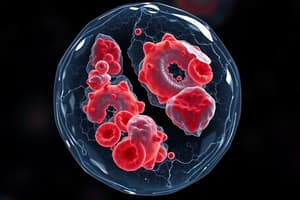Podcast
Questions and Answers
What is the primary purpose of the S phase in the cell cycle?
What is the primary purpose of the S phase in the cell cycle?
- To replicate the entire genome (correct)
- To prepare for cell division
- To check DNA for damage
- To produce proteins and organelles
During which phase of the cell cycle does a newly formed daughter cell grow and produce proteins?
During which phase of the cell cycle does a newly formed daughter cell grow and produce proteins?
- S phase
- G2 phase
- Mitosis
- G1 phase (correct)
What happens at the G2 checkpoint in the cell cycle?
What happens at the G2 checkpoint in the cell cycle?
- DNA replication is checked
- Cell size is monitored
- Nutrients are assessed
- Both B and C are checked (correct)
Which type of cell division results in two genetically identical daughter cells?
Which type of cell division results in two genetically identical daughter cells?
What is the characteristic of the G0 phase in the cell cycle?
What is the characteristic of the G0 phase in the cell cycle?
Which stage in mitosis follows metaphase?
Which stage in mitosis follows metaphase?
How does prokaryotic cell division occur?
How does prokaryotic cell division occur?
What is one of the main roles of checkpoints in the cell cycle?
What is one of the main roles of checkpoints in the cell cycle?
What occurs during anaphase in mitosis?
What occurs during anaphase in mitosis?
Which of the following accurately describes prophase I of meiosis?
Which of the following accurately describes prophase I of meiosis?
What is the primary goal of meiosis?
What is the primary goal of meiosis?
During which phase do chromosomes line up at the metaphase plate in meiosis?
During which phase do chromosomes line up at the metaphase plate in meiosis?
What is a characteristic feature of telophase in mitosis?
What is a characteristic feature of telophase in mitosis?
What happens during metaphase I of meiosis?
What happens during metaphase I of meiosis?
Which event distinguishes telophase from other phases in mitosis?
Which event distinguishes telophase from other phases in mitosis?
During which phase of meiosis do homologous pairs separate?
During which phase of meiosis do homologous pairs separate?
What occurs during Anaphase I of meiosis?
What occurs during Anaphase I of meiosis?
During Telophase I and Cytokinesis, what is formed?
During Telophase I and Cytokinesis, what is formed?
What happens to the centromeres during Anaphase II?
What happens to the centromeres during Anaphase II?
What characterizes Prophase II?
What characterizes Prophase II?
What is the main difference between meiosis and mitosis?
What is the main difference between meiosis and mitosis?
During which stage do single chromosomes align at the metaphase plate?
During which stage do single chromosomes align at the metaphase plate?
What occurs as a result of cytokinesis in meiosis?
What occurs as a result of cytokinesis in meiosis?
In which processes are the terms spermatogenesis and oogenesis used?
In which processes are the terms spermatogenesis and oogenesis used?
Flashcards are hidden until you start studying
Study Notes
Cell Cycle Overview
- Encompasses stages for cell division leading to the creation of genetically identical daughter cells.
- Ensures accurate duplication and segregation of DNA in chromosomes.
Phases of Cell Cycle
G1 Phase
- Newly formed daughter cell undergoes growth.
- Involves production of proteins and organelles, contributing to an increase in cell size.
S Phase
- Synthesis of new chromosomes from raw materials.
- Cell focuses on replicating its complete genome.
G2 Phase
- Characterized by significant protein synthesis.
- Cells verify the integrity of both DNA copies.
Mitosis
- Parent cell executes a series of steps to distribute materials, ensuring each daughter cell obtains essential materials and chromosome duplicates.
G0 Phase
- A resting metabolic state, maintaining the cell without preparing for division.
Cell Cycle Checkpoints
- G1 Checkpoint: Assesses nutrient availability, growth factors, and DNA damage.
- S Checkpoint: Monitors DNA synthesis.
- G2 Checkpoint: Evaluates cell size and DNA replication status.
Cell Division Types
- Prokaryotic Cell Division (Binary Fission).
- Eukaryotic Cell Division: Mitosis and Meiosis.
Prokaryotic Cell Division (Binary Fission)
- "Division in half" leading to asexual reproduction.
- Process involves genetic material duplication and division into two new organisms.
Eukaryotic Cell Division (Mitosis)
- Produces two daughter cells with identical genetic material.
- Goal is to ensure complete sets of chromosomes in each daughter cell.
- Stages of Mitosis remembered by "Pee on the MAT": Prophase, Prometaphase, Metaphase, Anaphase, Telophase.
Prophase
- Chromosomes condense and become visible.
- Spindle fibers emerge from centrosomes, with the nuclear envelope breaking down.
Prometaphase
- Chromosomes continue to condense.
- Kinetochores appear and spindle fibers attach to them.
Metaphase
- Chromosomes align at the metaphase plate.
- Each sister chromatid connected to spindle fibers from opposite poles.
Anaphase
- Centrosomes split, sister chromatids pulled to opposite poles.
- Certain spindle fibers elongate, contributing to cell elongation.
Telophase
- Chromosomes decondense as they reach opposite poles.
- Nuclear envelope reforms around chromosome sets, and the mitotic spindle disassembles.
Eukaryotic Cell Division (Meiosis)
- Single cell divides twice to produce four cells, each with half the original genetic content.
- Aims to form daughter cells with half as many chromosomes through two division processes: Meiosis I and Meiosis II.
Meiosis I - Homologue Pair Separation
- Stages: Prophase I, Metaphase I, Anaphase I, Telophase I.
Prophase I
- Chromosomes condense; homologous pairs align and pair up.
- Spindle apparatus begins to extend, nuclear envelope disappears.
Metaphase I
- Bivalent pairs align on the metaphase plate.
- Random positioning of chromosomes leads to genetic diversity.
Anaphase I
- Homologous chromosomes separate, moving to opposite poles without centromere splitting.
Telophase I & Cytokinesis
- Homologues reach poles, nuclear membranes reform, and cytokinesis produces two haploid daughter cells.
Meiosis II - Sister Chromatid Separation
- Stages: Prophase II, Metaphase II, Anaphase II, Telophase II.
Prophase II
- Nucleoli and nuclear envelopes disperse, chromatids shorten and thicken.
Metaphase II
- Chromosomes align on the metaphase plate, and kinetochores face opposite poles.
Anaphase II
- Centromeres separate; chromatids move towards opposite poles, now considered separate chromosomes.
Telophase II
- Nuclear envelopes form around each chromosome set, followed by cytokinesis resulting in four haploid daughter cells.
Gametogenesis
- The process forming gametes through meiosis.
- Spermatogenesis refers to sperm production, while oogenesis pertains to egg formation.
Studying That Suits You
Use AI to generate personalized quizzes and flashcards to suit your learning preferences.





